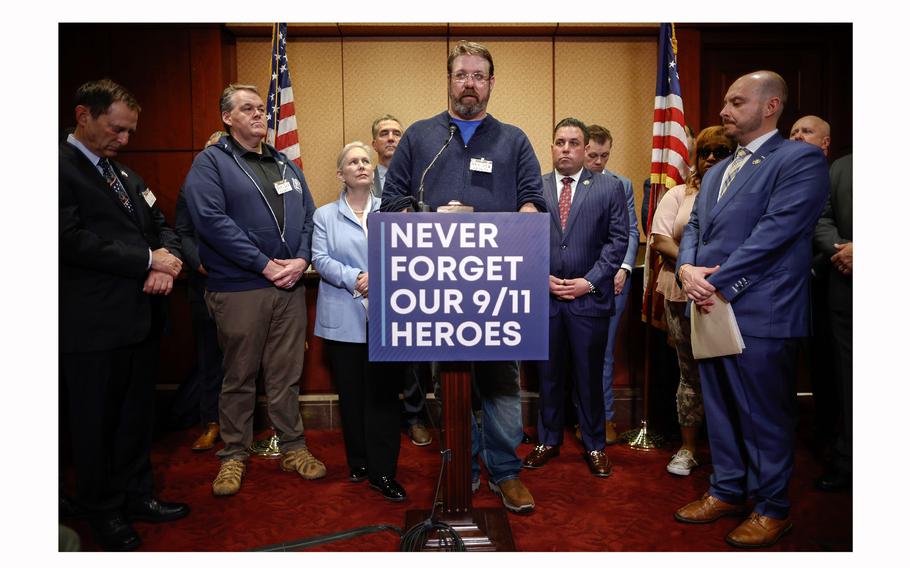
Army veteran Nate Coward speaks during a briefing at the U.S. Capitol in Washington on Feb. 28, 2023, to call for additional federal funding for people who were sickened by their work following the 9/11 terror attacks. Joined by other 9/11 first responders, advocates and members of Congress, Coward told of how he was denied benefits that were offered to emergency workers who responded to the World Trade Center. Last year, lawmakers delivered $1 billion for the World Trade Center Health Program. New legislation introduced in December 2023 will allow excluded Pentagon and Shanksville responders to join the program. (Chip Somodevilla, Getty Images/TNS)
(Tribune News Service) — The federal government is fixing a mistake that excluded members of the U.S. armed services who worked at Sept. 11 crash sites and came down with a 9/11 illness from getting pivotal health coverage, the Daily News has learned.
Additions to the bi-partisan National Defense Authorization Act will now allow soldiers and sailors, other Department of Defense personnel, and federal employees who helped sift through the rubble at the Pentagon and the destroyed remains of Flight 93 in Shanksville, PA to enroll in the World Trade Center Health Program.
When Congress initially wrote the legislation to give 9/11 responders health care, lawmakers failed to specify that members of the military qualified as first responders, leaving them out in the cold. Volunteers, police, firefighters, contractors and employees from federal law enforcement agencies were expressly included.
The National Defense Authorization Act also authorizes $676 million to the World Trade Center Health Program to cover rising costs and extending services to U.S. servicemen who have come down with a 9/11 illness, officials said.
“These funds will help sustain the health program for even longer as we work to make sure this program never runs out of the dollars it needs to ensure our Ground Zero heroes receive the treatments they need and the health care they deserve,” Senate Majority Leader Chuck Schumer (D-N.Y.) said in a statement.
Both the House and the Senate are expected to vote for the 3,000-page legislation next week. Once President Biden signs it, U.S. service members with a 9/11 illness will be able to enroll into the World Trade Center Health Program within a few months, according to retired U.S. Army Specialist Nate Coward, who has been pushing to get his fellow soldiers enrolled into the program.
Coward has been fighting to be put into the World Trade Center Health Program since 2015 when he came down with a number of 9/11-related health ailments, including sarcoidosis, a lung condition characteristic of many responders who breathed toxic smoke and dust.
He has also been diagnosed with PTSD from his time with other members of the Army’s famed Old Guard unit climbing in and out of the hole blasted in the side of the Pentagon, removing the remains of those who died, then interring them with honor in Arlington National Cemetery.
When Coward received a letter from the World Trade Center Program denying his coverage, he, his attorney and everyone else he knew thought it was a simple clerical error — until they learned that it was a mistake baked into the original law.
The retired soldier started a grassroots campaign to get federal legislators to amend the law, and even testified before Congress.
“It’s been a roller coaster ride and it’s been so frustrating, but I’m glad we’re getting somewhere,” Coward said while speaking at his home in Cottonville, WI. “It was hard for me not to take it personally. I know it was just bureaucratical nonsense, but you couldn’t help feel that someone was trying to mess with us.”
Over the years, he’s met with up to 50 soldiers assigned to the Pentagon in the days after 9/11 who have come down with an illness linked to the terror attacks.
“A few guys I served with have cancer and tumors, it weighs heavy on me,” Coward, 42, said. “My biggest fear was having someone come down and die from a 9/11 illness before we get our health care.”
Getting the change was a political struggle in itself. When the issue was raised, the Senate added the change to the National Defense Authorization Act and voted in favor of the bill 94-4, Coward recalled. But the rule change was never added to the House bill.
Rep. Andrew Garbarino (R-NY) finally got the change added to the House bill and got House Speaker Mike Johnson (R-LA) to support the move, Benjamin Chevat, executive director of Citizens for the extension of the James Zadroga Act said.
“Rep. Garbarino was instrumental in getting the Speaker’s support to have this provision included in the final Defense Bill,” Chevat said. “We are grateful for the continuing bipartisan efforts of the House and Senate, on behalf of 9/11 injured and ill responders.”
U.S. Military who were unable to enroll in the World Trade Center Health Program were still able to enroll in the federal 9/11 Victims Compensation Fund, and get some money to offset medical costs, through a private physician verification process where an independent doctor linked their ailments to their 9/11 toxin exposure, officials said.
Coward said he and his fellow soldiers felt Washington DC took no notice of their health needs after 9/11.
“There was a common feeling among all of us that we were being left behind and forgotten,” Coward, claiming that he and his brothers in arms don’t want to take anything away from the sacrifices made by the FDNY or New York first responders who raced to the World Trade Center that terrible day.
“This isn’t about recognition,” he said. “It’s about getting our health care so we’re not dying unnecessarily.”
©2023 New York Daily News.
Visit nydailynews.com
Distributed by Tribune Content Agency, LLC.